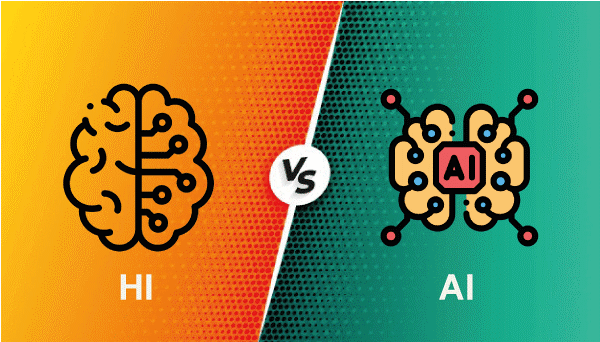Difference between Artificial Intelligence and Human Intelligence

What is Artificial Intelligence?
Any computer that simulates the functions of the human brain, such as critical thinking, decision-making, and increased productivity, can be referred to as having artificial intelligence. Fundamental to artificial intelligence (AI) are human insights that can be interpreted in a way that makes tasks easily executable by machines, no matter how complex or straightforward.
Combining intellectual processes, such as research, analysis, reasoning, and observation, produces synthesized insights. Artificial intelligence encompasses tasks like computer vision, robotics, control mechanisms, scheduling, and data mining.
What Is Human Intelligence?
A person's particular genetic makeup, growing up, and interactions with diverse circumstances and surroundings can all be linked to the origins of their intelligence and behavior. And it rests solely on an individual's ability to use newly learned knowledge to mould their environment.
It gives a variety of information. It might, for instance, reveal details about an individual with a comparable skill set or background, or it might disclose diplomatic material that a spy or locator was tasked with finding. It can provide data regarding how interests are arranged and interactions between individuals.
Difference between Artificial Intelligence and Human Intelligence
| Artificial Intelligence | Human Intelligence |
| 1. AI is a human-made creation; its father, John McCarthy, is credited with coining the phrase and setting up the first conference on machine intelligence research projects. Norbert Weiner, who theorized on feedback loops, is credited with contributing to the field's early development. | 1. The capacity for thought, reasoning, memory, and other cognitive functions is fundamental to humans. |
| 2. Computers digest information faster and with greater capacity than human beings. If a math issue takes five minutes to solve for a human mind, then an artificial intelligence system can solve ten problems in just one minute. | 2. If an AI system is well trained then it can perform much faster than human mind for a specific task. |
| 3. Due to its analysis based solely on collected data, AI is very objective when making decisions. | 3. However, subjective factors beyond numbers can also impact people's decisions. |
| 4. AI frequently generates correct results because it is predicated on preprogrammed rules. | 4. When it comes to human intellect, there's typically a margin for "human error" because certain things can be overlooked occasionally. |
| 5. In general, modern computers only consume 2 watts. | 5. The average human brain consumes 25 watts. |
| 6. Not cognizant of oneself or its surroundings. | 6. Possesses awareness of oneself and consciousness. |
| 7. Developed software and technological systems. | 7. Derived from the biological makeup of the brain. |
| 8. It is present in servers and electrical equipment. | 8. About living things. |
| 9. It is capable of swiftly learning from large amounts of data. | 9. Progressively gains knowledge through a combination of experience and study. |
| 10. Possesses a clear, accessible memory. | 10. Associative memory, affected by context and emotions, is a characteristic of human intelligence. |
| 11. It has no moral compass and acts according to preset ethics. | 11. Demonstrates moral and ethical judgement shaped by cultural norms and beliefs. |
| 12. Decision-making is algorithm-based and lacks actual intuition. | 12. Use instinct, gut instinct, and intuition when making decisions. |
| 13. Depends on calculated logic and lacks common sense inherently. | 13. It has rational and experience-based common sense. |
| 14. Restricted to inputs from sensors and data. | 14. Intricate perception of taste, smell, touch, sight, and sound. |
| 15. Battles to comprehend context in a sophisticated way. | 15. Can deduce meanings and understand context with ease. |
| 16. Follows predetermined goals to operate. | 16. Motivated by motives, aspirations, and personal objectives. |
| 17. It uses computerized language models to facilitate communication. | 17. Makes use of rich language, tone, and nonverbal clues to communicate. |
| 18. Performs well on tasks requiring parallel processing. | 18. Employs a more comprehensive strategy to balance several activities. |
| 19. Prone to biases in training sets. | 19. They can be overcome and actively managed, though. |
| 20. Develops as a result of upgrades and enhancements made by human programmers. | 20. Evolves across successive generations due to cultural growth and natural selection. |
A general summary of the differences between artificial and human intelligence in terms of their respective traits and capacities can be found in this table. But remember that AI is constantly changing, so these distinctions might not hold in the future.
Notably, both artificial intelligence and human intelligence possess distinct benefits and drawbacks, and they can work in concert for various purposes. Artificial intelligence (AI) is superior at tasks that need automation, scalability, and data processing, but human intelligence is more flexible, adaptable, and able to handle tasks that are intricate, nuanced, and emotionally charged.